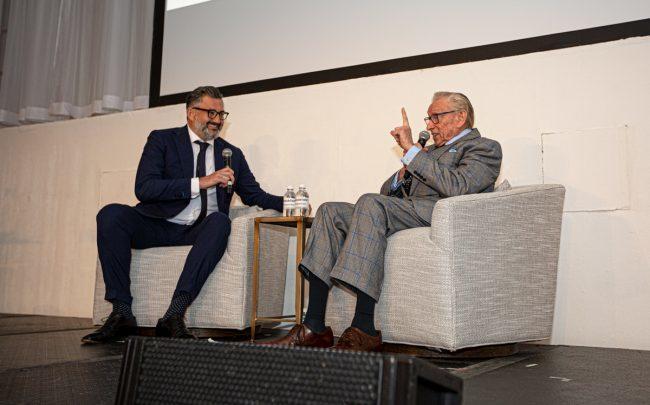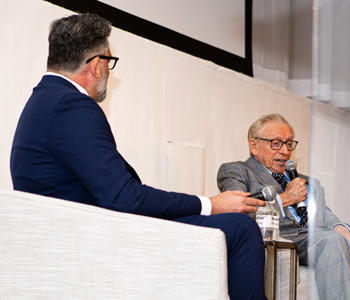
The Real Deal publisher Amir Korangy and Larry Silverstein (Credit: Emily Assiran)
Since being stood up by Rupert Murdoch in 2016, Larry Silverstein has been searching in vain for an anchor tenant to commit to the final piece of the World Trade Center redevelopment. But if he doesn’t find a suitor, he might be willing to walk down the aisle solo.
“Is it a consideration?” he said when asked by The Real Deal publisher Amir Korangy if he would build 2 World Trade Center on spec. “Of course, it’s a consideration.”

The Real Deal publisher Amir Korangy and Larry Silverstein
Silverstein and Korangy kicked off TRD’s 12th annual real estate showcase and forum at Manhattan’s Metropolitan Pavilion Wednesday with a wide-ranging discussion about Silverstein Properties’ WTC efforts, the political climate, and the evolution of New York’s Far West Side. The developer has been largely focused on rebuilding efforts ever since the 9/11 attacks, which occurred just six weeks after Silverstein secured the highly-coveted site.
“We couldn’t let the terrorists succeed,” Silverstein said, explaining his motivation for rebuilding. “And by putting the buildings back, we would defeat them.”
The complex is largely finished at this point, with the notable exception of 2 WTC. Murdoch’s News Corp. was planning to anchor the tower, which was to be designed by Bjarke Ingels, but pulled out of the deal.
Silverstein went through the phone call he received about that fateful decision. On Jan. 15, 2016, Murdoch essentially told him he did not like what he was seeing in the economy and the general state of the world at that time, which made him nervous about spending the amount of money it would take to move his company’s headquarters.
“Have you made a definitive, final decision?” Silverstein said he asked Murdoch. “He said, ‘We have made a definitive and final decision. We’re not going to take the move.’”
“It was unfortunate to lose them,” he continued.
Silverstein also weighed on Amazon’s abandonment of its plans to set up part of its second headquarters in Long Island City and the recently proposed and discarded pied-à-terre tax at the state level.
He blamed both the loss of Amazon and the idea for the tax on a general lack of knowledge among New York’s politicians.
“It’s these people who come into the metropolitan area of New York for a second home or whatever, who frequent the shops, who frequent the theaters, who like entertainment, who leave so much in the city by way of expenditures, which the city is dependent upon,” he said, “and so to lose them…it made absolutely no sense at all.”
Office space at the WTC complex has come online at roughly the same time as office space in Hudson Yards. Silverstein said he and Related Companies’ chair Steve Ross were fierce competitors, but he still respected what he has been able to accomplish on Manhattan’s Far West Side. He took the fact that both massive developments—along with Brookfield’s Manhattan West—have already been able to lease so much office space as a sign of the uniqueness of New York City.
“What other city in the world could accommodate 20 million square feet of new office space simultaneously?” he asked. “It’s an amazing thing.”
